


Bringing It All Back Home
by Rebecca McCarthy
Intro
|
Surviving The Amin Years
|
To Give Something Back
|
Promising Products

![]()
An Oppurtunity To Help Someone
To Give Something Back
While satisfying professionally and intellectually, Kisaalita’s research interests created a dilemma for him. Though none have yet been commercialized, the biosensors he is creating will benefit the middle-class—people who can afford to buy medicines produced by drug companies. What was he doing for the poor?
Kisaalita’s wife is a CPA; his four children are healthy and successful academically. He’s a full professor and a U.S. citizen with enough free time to jog around his Athens neighborhood. With such good fortune, “I had to give something back. I had to help.”
He felt especially obliged to help people like those he had grown up with, who eked out a living as best they could on $2 a day. But how? Though a native Ugandan, he had no credentials establishing him as an expert on economic development in Africa. Getting a grant from the U.S. Agency for International Development or some other foreign-aid organization didn’t seem feasible, he said.

In Morocco, poor women often join cooperatives that produce Argan oil, used locally for cooking.
But after learning more about funding agencies, Kisaalita realized that if he could involve undergraduates in international work, support would be available. And it has been: he has received help from the U.S. Department of Agriculture, the National Science Foundation, the Engineering Information Foundation and UGA’s Vice President for Outreach.
A small grant in 2000 allowed Kisaalita to spend three months at his alma mater in Kampala, teaching and conferring with colleagues. He traveled the country in search of possible projects and set up a program to accommodate four UGA students—three from engineering and one from some other discipline. The students would be paid for their summer work, just as they are at home. The four young Americans would live in university dorms and take day trips to various sites, where they would interact with residents needing help. To give the students a sense of who they would be helping and the culture in which they’d be working, Kisaalita interviewed potential clients and videotaped their responses. Two local university students would join the team.
Kisaalita set up his international program so that it would continue functioning back in Athens, not only for the returnees but also for those who follow. For example, a group of fourth-year engineering students works on an international problem all year for their capstone project of designing and refining a machine to help “the person on the bottom,” he said.
During spring break, the senior students take their design abroad and test it, then return and write a report about possible improvements. Third-year students draw on those reports when they travel to the same country for their own summer stay.
Intro
|
Surviving The Amin Years
|
To Give Something Back
|
Promising Products
For comments or for information please e-mail: rcomm@uga.edu
To contact the webmaster please email: ovprweb@uga.edu
![]()